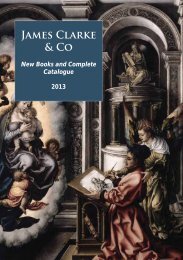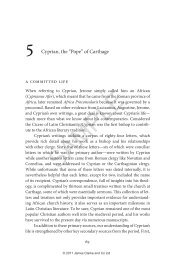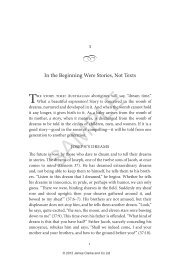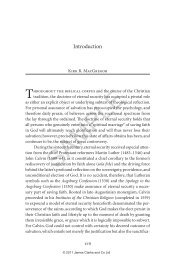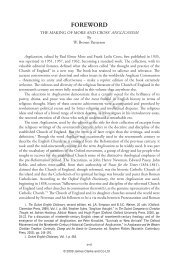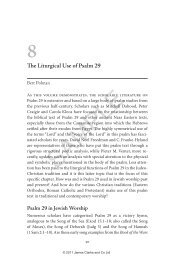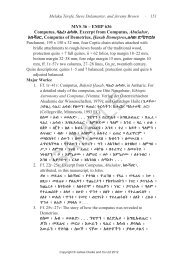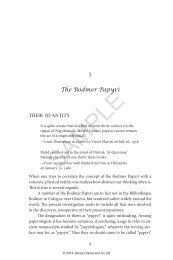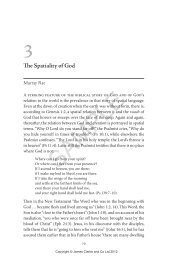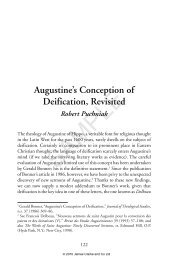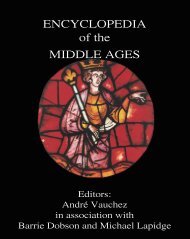Extract from Chapter 1 - James Clarke and Co Ltd
Extract from Chapter 1 - James Clarke and Co Ltd
Extract from Chapter 1 - James Clarke and Co Ltd
Create successful ePaper yourself
Turn your PDF publications into a flip-book with our unique Google optimized e-Paper software.
The Textual Words of the Analects <strong>and</strong> the Letter to the Galatians<br />
61<br />
Ethics is not to arrive at a doctrinal, logical formulation of behaviors.<br />
Ethics is leading people to participate in the beauty of the great order of<br />
life, as the cosmic dao (way or pattern) or universal principle (tianli) has<br />
it eternally, <strong>and</strong> as individuals fulfill the harmony (aesthetic delight) of<br />
the dao (the Way) in their moral life.<br />
The Power of the Analects: 14 From Yan (Word) to Wen (Culture)<br />
We have noted in the previous chapter that <strong>Co</strong>nfucius came in the tradition<br />
of teachers called ru who advocated a culture of studies <strong>and</strong> self-cultivation<br />
in place of physical force <strong>and</strong> domination, <strong>Co</strong>nfucius strengthened<br />
the teachings to become the so-called the school of <strong>Co</strong>nfucianism<br />
(Rujia). In the Analects we see <strong>Co</strong>nfucius’ emphasis in the power of the<br />
word as his means to redefine the role of teachers (ru). In the Analects the<br />
rhetoric of yan, word or speech, is especially important. The word yan is<br />
used 116 times throughout, <strong>and</strong> is often linked to virtue (Analects 12:10).<br />
<strong>Co</strong>nfucius contends that “[a] person of virtue is sure to speak eloquently,<br />
but a person who speaks eloquently is not necessarily virtuous” (Analects<br />
14:4). <strong>Co</strong>nfucianism holds the view that moral character is revealed in<br />
one’s speech (Analects 20:3). Lu writes, “The conceptualization of yan is<br />
<strong>Co</strong>nfucius’s invention <strong>and</strong> creation, <strong>and</strong> his Analects is the first treatise on<br />
Chinese speech <strong>and</strong> communication.” 15<br />
<strong>Co</strong>nfucius approves of using speech to persuade, to learn, <strong>and</strong> to<br />
cultivate oneself, but he does not approve of using speech for immoral<br />
gain. “It is rare, indeed, for a man with cunning words <strong>and</strong> an ingratiating<br />
face to be benevolent” (Analects 15:27). 16 <strong>Co</strong>nfucius “distastes clever<br />
talkers who overturn states <strong>and</strong> noble families” (17:18). 17 The exemplary<br />
person is described as “being slow in speech” (4:24) <strong>and</strong> “eager to show<br />
respect to his audience” (5:16). The rhetorical topoi to avoid include “feats<br />
of strength, disorder, <strong>and</strong> spiritual beings” (7:20).<br />
To be eloquent without ethical integrity does not persuade; to be<br />
virtuous is to be persuasive. As Robert Oliver has noted, “In constructing<br />
SAMPLE<br />
14. On rhetoric of <strong>Co</strong>nfucianism, see Lu, Rhetoric in Ancient China, 154–94; Qian,<br />
Lunyu Xinjie, 1–3.<br />
15. Lu, Rhetoric in Ancient China, 163.<br />
16. Lau, trans., Analects, 155.<br />
17. Ibid., 177.<br />
© 2008 <strong>James</strong> <strong>Clarke</strong> <strong>and</strong> <strong>Co</strong> <strong>Ltd</strong>



